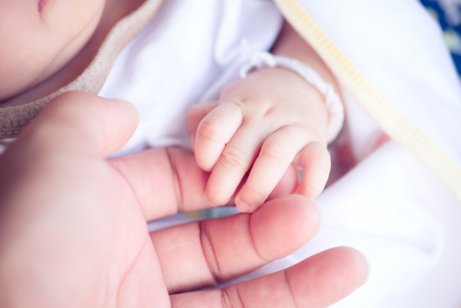What Happens During the Postpartum Period?

The postpartum period refers to the time during which women should rest in order to recover physically and emotionally after the birth of their baby. During this stage, which lasts from 6 to 8 weeks, the woman undergoes certain changes that deserve special attention.
After giving birth, women need some time to achieve physical and mental balance. During the postpartum period, women should receive all the support they need to recover. This way they’ll be able to fully enjoy the new relationship with their newborn child.
This is a time when the husband, and other family members, should do everything they can to help the mother and nurture the bond between mother and child.
Without a doubt, the postpartum period represents a time of emotional ups and downs. These ups and downs help get new moms used to their new lifestyle.
The mother’s main focus during this time is on breastfeeding and caring for her child, as well as looking after herself.
Tips to keep in mind during the postpartum period
It’s very important for pregnant women to understand what will happen during this period. Here are some practical suggestions:
- Accept support: during this stage you have to swallow your pride and accept any offer of help! Don’t be shy about asking for help either, whenever you need it.
- Before giving birth, try to prepare and freeze enough food for a few weeks. It’s a good idea to use plastic cups and plates to cut down on the washing up.
- Rest is very important during this period. Try to rest as much as possible. Your body needs to recover from labor and 9 months of pregnancy.

What are the physical changes during the postpartum period?
During the postpartum period you’ll notice some very significant physical changes. These include episodes of sweating, an increase in breast size because of milk rush, and the swelling of the lower extremities.
There are other problems too. It’s quite common to leak a little urine if you laugh, cough or move suddenly. Pelvic floor exercises can help combat this.
Unfortunately, hemorrhoids are also very common after birth. We recommend that you eat plenty of fresh fruit, vegetables, salads, whole grains and drink plenty of water.
Vaginal bleeding is also very common during this period. Don’t worry too much about this, though, as it will disappear over time.
It’s also important for women to refrain from using tampons and having sex during the postpartum period. The vaginal area needs this time to heal completely.
“Motherhood is not just about taking nine months to give birth to babies with a healthy body, but also to give birth to them spiritually”
–Victoria Ocampo–
As far as your belly is concerned, you shouldn’t worry unduly. Keep in mind that muscles stretch during birth, and this causes it to increase in size.
As for stretch marks, these will gradually acquire a lighter color. It is, however, impossible to eliminate them completely.
We always recommend that you follow a balanced diet. After 40 days of rest you can start to exercise with moderate intensity. Little by little, your body will gradually return to normal and you’ll feel much more like your normal self.

Emotional changes during the postpartum
During this period, very important emotional changes occur as well. The arrival of the baby means a radical change in lifestyle, and you’ll need time to adapt to this new situation.
From now on, you’ll need time to combine your personal situation, the care of the child and the housework. You’ll need the full support and help of your partner and the rest of the family in order to do this.
It’s certainly a delicate new stage of life, in which you’ll experience many different sensations. Your sleep pattern will probably be altered by your baby’s cries, as you discover that your child is now your priority.
In some cases, new moms feel sadness and bouts of depression that are caused by this sudden change in their day-to-day life. We recommend being patient and enjoying this unique part of your life. All of these changes are completely normal!
The experience of being a mother isn’t a simple one. You should take your time as your body tries to recover from the fatigue. Little by little you’ll adapt to your new role. Don’t try to be a perfect mother, just do the best you can.
Finally, remember that the postpartum period is an opportunity for the mother to recover after those nine months. It’s also a time to form a bond with her new child. It’s important for you to approach everything in a positive way, and to simply enjoy these first unforgettable moments with your new baby.
This text is provided for informational purposes only and does not replace consultation with a professional. If in doubt, consult your specialist.








